Books by Guido Bartolini

Mediating Historical Responsibility Memories of ‘Difficult Pasts’ in European Cultures, 2024
Mediating Historical Responsibility brings together leading scholars and new voices in the interd... more Mediating Historical Responsibility brings together leading scholars and new voices in the interdisciplinary fields of memory studies, history, and cultural studies to explore the ways culture, and cultural representations, have been at the forefront of bringing the memory of past injustices to the attention of audiences for many years. Engaging with the darkest pages of twentieth-century European history, dealing with the legacy of colonialism, war crimes, genocides, dictatorships, and racism, the authors of this collection of critical essays address Europe’s ‘difficult pasts’ through the study of cultural products, examining historical narratives, literary texts, films, documentaries, theatre, poetry, graphic novels, visual artworks, material heritage, and the cultural and political reception of official government reports. Adopting an intermedial approach to the study of European history, the book probes the relationship between memory and responsibility, investigating what it means to take responsibility for the past and showing how cultural products are fundamentally entangled in this process.
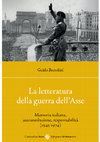
Carocci, 2023
Il libro offre il primo studio approfondito dei modi in cui la letteratura italiana del secondo d... more Il libro offre il primo studio approfondito dei modi in cui la letteratura italiana del secondo dopoguerra ha rappresentato le guerre di aggressione e i regimi di occupazione dell’Italia fascista durante la Seconda guerra mondiale, una serie di eventi che vengono qui chiamati “Guerra dell’Asse”. Grazie a una metodologia innovativa, che combina teorie dei memory studies, storiografia, narratologia e critica tematica, il volume delinea un viaggio testuale lungo tre decenni che attraverso lo studio di figure di ripetizione quali topoi, temi e masterplots esplora il contributo delle opere letterarie alla formazione di una memoria della guerra e del fascismo. Passando in rassegna i numerosi contenuti etici di questa spesso dimenticata letteratura di guerra, il testo indaga il rapporto fra letteratura e memoria collettiva chiedendosi fino a che punto la letteratura della Guerra dell’Asse sia stata in grado di aiutare i lettori a sviluppare un senso di responsabilità per i crimini del passato.

Palgrave Macmillan, 2021
The book investigates the representation of the Axis War – the wars of aggression that Fascist It... more The book investigates the representation of the Axis War – the wars of aggression that Fascist Italy fought in North Africa, Greece, the Soviet Union, and the Balkans, from 1940 to 1943 – in three decades of Italian literature. Building on an innovative and interdisciplinary methodology, which combines memory studies, historiography, thematic criticism, and narratology, this book explores the main topoi, themes, and masterplots of an extensive corpus of novels and memoirs to assess the contribution of literature to the reshaping of Italian memory and identity after the end of Fascism. By exploring the influence that public memory exercises on literary depictions and, in return, the contribution of literary texts to the formation and dissemination of a discourse about the past, the book examines to what extent Italian literature helped readers form an ethical awareness of the crimes committed by members of their national community during World War II
Questo libro nasce dalla rielaborazione della tesi di laurea magistrale di Guido Bartolini sulla ... more Questo libro nasce dalla rielaborazione della tesi di laurea magistrale di Guido Bartolini sulla relazione tra letteratura classica e cultura moderna
all’inizio del 900. Il centro attorno a cui si sviluppa questo studio è
il concetto di classico, con i suoi plurimi significati, i suoi riusi e le
sue contraddizioni. Il mondo classico
occupa oggi giorno una posizione periferica all’interno del campo
degli studi letterari; tuttavia esso ha costituito per secoli il baricentro
della cultura Occidentale ed anche il XX secolo non ha mai smesso
di interrogarsi sul rapporto tra cultura antica e contemporaneità.
Special Issues by Guido Bartolini
Annali d'Italianistica 41 2023
Annalid'italianistica,Inc., wasfounded at theUniversityofNotre Dame in 1983 andw as sponsoredby t... more Annalid'italianistica,Inc., wasfounded at theUniversityofNotre Dame in 1983 andw as sponsoredby theD epartmento fR omance Studiesa tt he University of NorthC arolinaa tC hapelH illf rom1 989u ntil 2017.H ostedb yJSTOR, Annali d'italianistica is an independentjournal of ItalianStudies managedand editedby an internationalteamofscholars. Annali is listed amongthe toptierjournals(class A, area 10)bythe ItalianNationalAgencyfor theEvaluationofUniversitiesand Research Institutes(ANVUR). It is listed in theEuropeanReference Indexfor the Humanities andS ocialS ciences(ERIH PLUS). It is listed in theM LA InternationalB ibliography.I ti samember of theT he Councilo fE ditors of LearnedJournals(CELJ).
Articles by Guido Bartolini
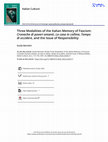
Italian Culture , 2024
This article examines the moral and political questions raised by Fascism through an analysis of ... more This article examines the moral and political questions raised by Fascism through an analysis of three canonical postwar Italian novels: Vasco Pratolini’s Cronache di poveri amanti, Cesare Pavese’s La casa in collina, and Ennio Flaiano’s Tempo di uccidere. By exploring the specific memory of Fascism that these texts create, the article shows that their different approaches to the past depend on distinct conceptualizations of responsibility, which are defined as “antagonistic,” “multiperspectival-butrestricted,” and “perpetrator-centered.” Pratolini’s novel condemns the regime and portrays ordinary Italians as resistant to the fascist regime. Pavese’s work offers a more nuanced, multiperspectival approach, yet limits its ethical reflection to the Italian Civil War, leaving other crucial aspects of fascist history unaddressed. In contrast, Flaiano’s Tempo di uccidere foregrounds a memory centered on both individual guilt and collective responsibility for fascist and colonial crimes. The article argues that the modalities informing Pratolini’s and Pavese’s works are related to approaches to the fascist past that dominated Italian collective memory in the 1960s and early 2000s, while the mnemonic modality of Flaiano’s novel has been largely subordinate in Italian memory culture. Through this comparative literary analysis, the article challenges existing interpretations of these canonical works, and it underscores the role of postwar literature in shaping diverse memories of Fascism.
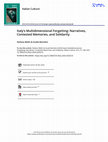
This article introduces the concept of “multidimensional forgetting” and the theoretical framewor... more This article introduces the concept of “multidimensional forgetting” and the theoretical framework of the special issue Italian Amnesias: Multidimensional Forgetting in Contemporary Italy. Building on recent developments in memory studies, postcolonial studies, Black Mediterranean geographies, political theory, narrative hermeneutics, and Italian literary and cultural studies, the introduction argues that to understand Italy’s relationship with its past, we need to consider multiple forms of forgetting and weave together the concepts of cultural memory and political responsibility. Italy’s difficulties in coming to terms with its past are the result of enduring cultural narratives that have shaped a selfabsolving doxa about Italy’s past wrongdoings and ongoing structural violence. To challenge the cultural stereotypes, national myths, and narrative habits that feed the disavowal of Italy’s implication in histories and present scenes of violence, we need to consider the multiple causes, means, and effects of Italy’s distorted self-image. This introduction invites us to do so by addressing Italy’s politics of memory in a cross-referencing, expansive, and intersectional fashion and by introducing the ten articles included in the special issue. The goal of these contributions is to map the construction of social forgetting in Italy’s cultural and public debates, explore its consequences throughout the decades, and identify attempts to counter it through forms of critical interaction that foster transcultural solidarity and responsibility. We aim to intervene in Italy’s relationship with its past in order to problematize the present and the future of a country that is currently at the heart of the global far-right, white nationalism, and neo-fascist political resurgence, and that plays a crucial role in the racially exclusionary politics of Fortress Europe.

Annali d'Italianistica , 2024
Sinossi: L'articolo indaga il ruolo della Storia di Elsa Morante nell'elaborazione della memoria... more Sinossi: L'articolo indaga il ruolo della Storia di Elsa Morante nell'elaborazione della memoria collettiva del passato italiano in relazione a tre macro eventi: la Shoah, la Resistenza e la Guerra dell'Asse. Attraverso un'analisi testuale approfondita della rappresentazione di questi eventi storici nel romanzo, l'articolo mette in luce le importanti innovazioni introdotte dalla Storia nel panorama della memoria dell'Italia degli anni Settanta-soprattutto per quanto riguarda la Shoah e la Resistenza. Allo stesso tempo, l'articolo evidenzia i limiti del discorso sul passato sviluppato dal romanzo che ha teso a riproporre alcuni dei tropi acritici della memoria pubblica del dopoguerra-specie per quel che riguarda la Guerra dell'Asse e la mancata indagine sui carnefici italiani. L'analisi viene sviluppata mettendo in dialogo la critica letteraria sulla Storia e gli studi riguardanti la memoria italiana e le teorie dei memory studies, contribuendo così a una comprensione approfondita della funzione del romanzo di Morante come vettore di memoria.

Mediating historical responsibility : memories of ‘difficult pasts’ in European cultures (De Gruyter), 2024
Mediating Historical Responsibility brings together leading scholars and new voices in the interd... more Mediating Historical Responsibility brings together leading scholars and new voices in the interdisciplinary fields of memory studies, history, and cultural studies to explore the ways culture, and cultural representations, have been at the forefront of bringing the memory of past injustices to the attention of audiences for many years. Engaging with the darkest pages of twentieth-century European history, dealing with the legacy of colonialism, war crimes, genocides, dictatorships, and racism, the authors of this collection of critical essays address Europe’s ‘difficult pasts’ through the study of cultural products, examining historical narratives, literary texts, films, documentaries, theatre, poetry, graphic novels, visual artworks, material heritage, and the cultural and political reception of official government reports. Adopting an intermedial approach to the study of European history, the book probes the relationship between memory and responsibility, investigating what it means to take responsibility for the past and showing how cultural products are fundamentally entangled in this process.
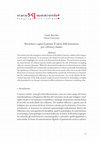
STATUS QUAESTIONIS , no. 26, pp. 79–102, 2024
The article traces the emergence and evolution of the field of memory studies and its impact on t... more The article traces the emergence and evolution of the field of memory studies and its impact on the study of literature. It reconstructs the initial first and second waves of memory research, and it highlights key trends in its third and fourth phases. The article then examines the main theories of cultural memory studies and explores the role of literature in shaping collective memory dynamics. While the theoretical foundations of cultural memory studies prioritise intermedial and contextualist interpretations of culture, potentially downplaying the significance of literature, the article shows that recent works with a focus on the ethical dimensions of memory narratives have reaffirmed the crucial role of literature as a heuristic tool for understanding and reflecting on the past and present. As a result, despite the theoretical trajectory of the field, memory studies research interested in developing a complex ethical perspective on the past continues to affirm and preserve literature's enduring value.

Annali d'Italianistica 41 , 2023
Vasco Pratolini’s Un eroe del nostro tempo (1949) and Alberto Moravia’s Il conformista (1951) sha... more Vasco Pratolini’s Un eroe del nostro tempo (1949) and Alberto Moravia’s Il conformista (1951) share an odd similarity: these novels were harshly dismissed by their contemporary critics and represent two of the least successful works of these otherwise widely celebrated writers. Both texts featured a Fascist character as main protagonist, a common feature that contributed to their problematic reception. What most critics failed to notice, though, is that through their protagonists, these novels set out an interrelated reflection on the nature of Fascism that contrasts an essentialist interpretation of it with a psycho-sociological one. By relying on both close-readings and the study of postwar critical reception, the article shows the limits of Pratolini’s work, which conceptualises Fascism in accordance to a deviancy trope, and re-interprets Moravia’s novel as a coherent narrative revolving around the theme of implication in Fascist crimes.
Annali d'Italianistica 41 , 2023
La Seconda guerra Mondiale e La Letteratura: cronache memorie riemersioni a cura di Fabrizio Miliucci, Davide Pettinicchio, Flavia Di Battista, Svolte. Teoria critica e letterature comparate, 2023
mia bocca è quasi muta»: Saba e la tragedia dell'ultima guerra tra oblio e memoria Katarzyna Jopa... more mia bocca è quasi muta»: Saba e la tragedia dell'ultima guerra tra oblio e memoria Katarzyna Jopa, Motif du jouet et d'autres attributs de l'univers enfantin dans l'oeuvre de guerre des Colomb Natália ruSnáková, Due soldati-poeti slovacchi sul fronte italiano. Poesia come memoria storica per impressione Ivan taSSi, Al cospetto di Medusa. La guerra come problema narrativo in Pavese, Calvino e Fenoglio Alessandra treviSan, Guerra, politica e memoria ne I giorni della nostra vita di Marina Sereni
Modern Italy, 2022
This article consists of interviews with five world experts on the memory of Fascism. Taking the ... more This article consists of interviews with five world experts on the memory of Fascism. Taking the centenary of the March on Rome as an opportunity to rethink the development of Italian collective memory, the five interviewees were asked to reflect on different aspects of the Italian memory of Fascism, addressing the dominant conceptualisations, limits, and transformations of the discourses used to narrate Fascism in Italian culture. The result of these conversations, which touch upon issues related to the memory of the Resistance, the Second World War, the Holocaust, and colonialism, is a rich overview of the main trends and current trajectories of Italian memory culture, which can help us imagine the future directions of the Italian memory of Fascism and enhance interventions in this field by memory scholars and memory activists.

Passato e presente nel cinema italiano. Storia e società sul grande schermo, ed. by Chiara DeSanti and Federica Colleoni (Manziana: Vecchiarelli Editore, 2022), pp. 31-52, 2022
La guerra dell’Asse, combattuta dall’Italia fascista a fianco della Germania di Hitler, è per lun... more La guerra dell’Asse, combattuta dall’Italia fascista a fianco della Germania di Hitler, è per lungo tempo rimasta ai margini della ricerca accademica italiana ed internazionale. Negli ultimi venti anni, tuttavia, lo stato degli studi è profondamente cambiato ed una nuova generazione di storici ha mostrato un rinnovato interesse in questa fase della seconda guerra mondiale, pubblicando numerose opere sulle occupazioni italiane in Grecia, nei Balcani e nell’Unione Sovietica (Rodogno 2003; Gobetti 2007; Schlemmer 2009; Giusti 2016). Rispetto all’approfondirsi della comprensione storica, lo studio della produzione culturale legata alla guerra dell’Asse resta ancora parziale e limitato, concentrato più su una serie di casi specifici che su di una visione di insieme. Questo articolo vuole offrire una mappatura della rappresentazione cinematografica italiana della guerra dell’Asse nel corso del novecento, ricostruendo le fasi salienti del complicato rapporto che il cinema italiano ha instaurato con il difficile lascito della guerra fascista.
Partendo dalle numerose pellicole prodotte nel dopoguerra, già oggetto di recenti indagini scientifiche (Fantoni 2018), l’articolo mostra che a questa iniziale, acritica, ma ampia produzione, incentrata sui valori del nazionalismo cattolico, che recuperava stilemi del tardo cinema di guerra fascista (Ben Ghiat 2015; Zambenedetti 2017), è seguita una fase di progressiva estromissione della guerra dell’Asse dal panorama cinematografico italiano. Per illustrare tale processo l’articolo prende in esame una serie di film progettati negli anni 50 e 60 che, a seguito di meccanismi censorii diretti ed indiretti, non furono mai realizzati, come le sceneggiature sull’occupazione italiana in Grecia di Ugo Pirro e Renzo Renzi e gli adattamenti dei testi letterari di Renzo Biasion e Mario Rigoni Stern, che avevano attratto l’attenzione di registi del calibro di Roberto Rossellini ed Ermanno Olmi. Anche in conseguenza del fallimento di tali progetti, nei decenni successivi solo un numero esiguo di film ha trattato in modo specifico la guerra dell’Asse, dandone una rappresentazione edulcorata e auto-assolutoria, tutta incentrata sul mito identitario degli Italiani brava gente. L’articolo analizza questa costruzione discorsiva, che si è progressivamente affermata come perno centrale della memoria italiana della seconda guerra mondiale (Focardi 2013), concentrandosi su due film, I due colonnelli di Steno e Italiani Brava Gente di Giuseppe De Santis, mostrando il ruolo fondamentale della rielaborazione cinematografica nella trasmissione della memoria pubblica del passato (Erll 2011).
I due filoni principali della rappresentazione italiana della guerra dell’Asse indagati da questo articolo, ossia quello acritico nazionalista, dominante nel dopoguerra, e quello successivo, più rado, ma costante, incentrato sull’idea autoassolutoria degli italiani buoni ed innocui, hanno mascherato il ruolo di aggressore dell’esercito italiano sotto il fascismo, impedendo che il cinema potesse fungere da piattaforma per una riflessione sulle colpe e responsabilità degli italiani in relazione alla seconda guerra mondiale. L’articolo si chiude sondando se una rappresentazione diversa della guerra dell’Asse, che consentisse una riflessione critica sul passato, sia mai stata tentata dal cinema italiano, offrendone esempi tratti dai film Le soldatesse di Valerio Zurlini e Il generale dell'armata morta di Luciano Tovoli.

Past (Im)in Perfect Continuous Trans-Cultural Articulations of the Postmemory of WWII, ed. by Alice Balestrino (Sapienza University Press), 2021
The Axis War had a complex legacy in postwar Italy: it remained at the margin of the commemoratio... more The Axis War had a complex legacy in postwar Italy: it remained at the margin of the commemorations promoted by the state, was often overlooked by historical enquiries, and was generally neglected by cinematic mediations. As a result, the transmission and circulation of memory narratives of the Axis War within the Italian community of memory have been largely hampered. Yet, memories of the Axis campaigns and occupations circulated across the Italian community thanks, above all, to narrative texts, which constituted the main vectors of memory of Italy's participation in World War Two as a Fascist nation.
In this paper I would like to explore the representations developed by the Axis War literature in three decades after the end of the Second World War. I will show that among literary vectors of memory three texts, written in the 1950s by Pirro, Terrosi, and Lunardi, helped readers gain awareness of Italy's role as a repressive power, thanks to representations of the Italian use of violence and a thematisation of the protagonists' sense of guilt. However, the paper will highlight that a similar narrativisation of the war years, which encouraged readers to take on responsibility for Italy's Fascist past, has constituted an exception. The majority of narrative texts dealing with the Axis War presented the Italians as victims of war and adopted a series of topoi that conveyed the idea of Italy's innocence. This overbearing representation, continuously remediated across Italian society, hindered the formation of a responsible memory of the Axis War and contributed to evading Italy's responsibilities for Fascism.

Italian Studies, 2020
The article discusses the story of the armata sagapò as a war rumour, putting it in relation to t... more The article discusses the story of the armata sagapò as a war rumour, putting it in relation to three other unverified stories of the Second World War that circulated in post-war Italy, i.e. the anecdote of the Soviet dispatch number 630, the speech attributed to Churchill on the performance of the Folgore divisions at El Alamein, and the myth of Italiani brava gente. It shows that all the considered narratives were structured around a common pro- cess of ventriloquisation and, by relying on the sociological scholarship that has investigated the phenomenon of rumours, argues that the formation and circulation of these pieces of hearsay were related to the process of renegotiation of Italian identity that followed the collapse of Fascism. While doing this, the article questions the veracity of the story of the sagapò nickname putting forward a new explanation for its creation.

Istoricheskaya ekspertiza, 2018
After World War II the memory of the war campaigns fought by Fascist Italy in the Axis War tended... more After World War II the memory of the war campaigns fought by Fascist Italy in the Axis War tended to be marginalised in the Italian memory culture. Among these neglected war theatres the Eastern Front was the one that received more attention: not only did it constitute a matter of political disputes during the 1950s, but was also a frequent subject of literary depictions. Yet the representation of Italy's participation in the invasion of the Soviet Union developed by postwar Italian culture was particularly biased and uncritical. Affected by suffering and by the experience of defeat, the memory narratives about this war campaign conveyed to the Italians a series of self-absolving myths, which were structured around concepts drawn from Catholic culture. Numerous historical works published in the last decade have exposed the limits of this memory discourse and might have paved the way to a renovation of the Italian memory of the 'Russian campaign'.
Book Reviews by Guido Bartolini
Modern Italy, 2024
Review of:
Rethinking Fascism: The Italian and German Dictatorships
edited by Andrea Di Michele... more Review of:
Rethinking Fascism: The Italian and German Dictatorships
edited by Andrea Di Michele and Filippo Focardi, Berlin/Boston, De Gruyter, 2022, vi + 335 pp., £84.50 (hardback), ISBN 978-3-11076645-5
Italian Fascism, 1914–1945: Themes and Interpretations
Claudia Baldoli, Cham, Palgrave Macmillan, 2023, vi + 122 pp., £27.99 (paperback), ISBN 978-3-031-41903-4
Late Fascism: Race, Capitalism and the Politics of Crisis
Alberto Toscano, London/New York, Verso, 2023, xii + 208 pp., £17.99 (paperback), ISBN 978-1-839-76020-4




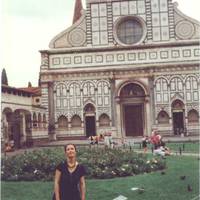





Uploads
Books by Guido Bartolini
all’inizio del 900. Il centro attorno a cui si sviluppa questo studio è
il concetto di classico, con i suoi plurimi significati, i suoi riusi e le
sue contraddizioni. Il mondo classico
occupa oggi giorno una posizione periferica all’interno del campo
degli studi letterari; tuttavia esso ha costituito per secoli il baricentro
della cultura Occidentale ed anche il XX secolo non ha mai smesso
di interrogarsi sul rapporto tra cultura antica e contemporaneità.
Special Issues by Guido Bartolini
Articles by Guido Bartolini
Partendo dalle numerose pellicole prodotte nel dopoguerra, già oggetto di recenti indagini scientifiche (Fantoni 2018), l’articolo mostra che a questa iniziale, acritica, ma ampia produzione, incentrata sui valori del nazionalismo cattolico, che recuperava stilemi del tardo cinema di guerra fascista (Ben Ghiat 2015; Zambenedetti 2017), è seguita una fase di progressiva estromissione della guerra dell’Asse dal panorama cinematografico italiano. Per illustrare tale processo l’articolo prende in esame una serie di film progettati negli anni 50 e 60 che, a seguito di meccanismi censorii diretti ed indiretti, non furono mai realizzati, come le sceneggiature sull’occupazione italiana in Grecia di Ugo Pirro e Renzo Renzi e gli adattamenti dei testi letterari di Renzo Biasion e Mario Rigoni Stern, che avevano attratto l’attenzione di registi del calibro di Roberto Rossellini ed Ermanno Olmi. Anche in conseguenza del fallimento di tali progetti, nei decenni successivi solo un numero esiguo di film ha trattato in modo specifico la guerra dell’Asse, dandone una rappresentazione edulcorata e auto-assolutoria, tutta incentrata sul mito identitario degli Italiani brava gente. L’articolo analizza questa costruzione discorsiva, che si è progressivamente affermata come perno centrale della memoria italiana della seconda guerra mondiale (Focardi 2013), concentrandosi su due film, I due colonnelli di Steno e Italiani Brava Gente di Giuseppe De Santis, mostrando il ruolo fondamentale della rielaborazione cinematografica nella trasmissione della memoria pubblica del passato (Erll 2011).
I due filoni principali della rappresentazione italiana della guerra dell’Asse indagati da questo articolo, ossia quello acritico nazionalista, dominante nel dopoguerra, e quello successivo, più rado, ma costante, incentrato sull’idea autoassolutoria degli italiani buoni ed innocui, hanno mascherato il ruolo di aggressore dell’esercito italiano sotto il fascismo, impedendo che il cinema potesse fungere da piattaforma per una riflessione sulle colpe e responsabilità degli italiani in relazione alla seconda guerra mondiale. L’articolo si chiude sondando se una rappresentazione diversa della guerra dell’Asse, che consentisse una riflessione critica sul passato, sia mai stata tentata dal cinema italiano, offrendone esempi tratti dai film Le soldatesse di Valerio Zurlini e Il generale dell'armata morta di Luciano Tovoli.
In this paper I would like to explore the representations developed by the Axis War literature in three decades after the end of the Second World War. I will show that among literary vectors of memory three texts, written in the 1950s by Pirro, Terrosi, and Lunardi, helped readers gain awareness of Italy's role as a repressive power, thanks to representations of the Italian use of violence and a thematisation of the protagonists' sense of guilt. However, the paper will highlight that a similar narrativisation of the war years, which encouraged readers to take on responsibility for Italy's Fascist past, has constituted an exception. The majority of narrative texts dealing with the Axis War presented the Italians as victims of war and adopted a series of topoi that conveyed the idea of Italy's innocence. This overbearing representation, continuously remediated across Italian society, hindered the formation of a responsible memory of the Axis War and contributed to evading Italy's responsibilities for Fascism.
Book Reviews by Guido Bartolini
Rethinking Fascism: The Italian and German Dictatorships
edited by Andrea Di Michele and Filippo Focardi, Berlin/Boston, De Gruyter, 2022, vi + 335 pp., £84.50 (hardback), ISBN 978-3-11076645-5
Italian Fascism, 1914–1945: Themes and Interpretations
Claudia Baldoli, Cham, Palgrave Macmillan, 2023, vi + 122 pp., £27.99 (paperback), ISBN 978-3-031-41903-4
Late Fascism: Race, Capitalism and the Politics of Crisis
Alberto Toscano, London/New York, Verso, 2023, xii + 208 pp., £17.99 (paperback), ISBN 978-1-839-76020-4
all’inizio del 900. Il centro attorno a cui si sviluppa questo studio è
il concetto di classico, con i suoi plurimi significati, i suoi riusi e le
sue contraddizioni. Il mondo classico
occupa oggi giorno una posizione periferica all’interno del campo
degli studi letterari; tuttavia esso ha costituito per secoli il baricentro
della cultura Occidentale ed anche il XX secolo non ha mai smesso
di interrogarsi sul rapporto tra cultura antica e contemporaneità.
Partendo dalle numerose pellicole prodotte nel dopoguerra, già oggetto di recenti indagini scientifiche (Fantoni 2018), l’articolo mostra che a questa iniziale, acritica, ma ampia produzione, incentrata sui valori del nazionalismo cattolico, che recuperava stilemi del tardo cinema di guerra fascista (Ben Ghiat 2015; Zambenedetti 2017), è seguita una fase di progressiva estromissione della guerra dell’Asse dal panorama cinematografico italiano. Per illustrare tale processo l’articolo prende in esame una serie di film progettati negli anni 50 e 60 che, a seguito di meccanismi censorii diretti ed indiretti, non furono mai realizzati, come le sceneggiature sull’occupazione italiana in Grecia di Ugo Pirro e Renzo Renzi e gli adattamenti dei testi letterari di Renzo Biasion e Mario Rigoni Stern, che avevano attratto l’attenzione di registi del calibro di Roberto Rossellini ed Ermanno Olmi. Anche in conseguenza del fallimento di tali progetti, nei decenni successivi solo un numero esiguo di film ha trattato in modo specifico la guerra dell’Asse, dandone una rappresentazione edulcorata e auto-assolutoria, tutta incentrata sul mito identitario degli Italiani brava gente. L’articolo analizza questa costruzione discorsiva, che si è progressivamente affermata come perno centrale della memoria italiana della seconda guerra mondiale (Focardi 2013), concentrandosi su due film, I due colonnelli di Steno e Italiani Brava Gente di Giuseppe De Santis, mostrando il ruolo fondamentale della rielaborazione cinematografica nella trasmissione della memoria pubblica del passato (Erll 2011).
I due filoni principali della rappresentazione italiana della guerra dell’Asse indagati da questo articolo, ossia quello acritico nazionalista, dominante nel dopoguerra, e quello successivo, più rado, ma costante, incentrato sull’idea autoassolutoria degli italiani buoni ed innocui, hanno mascherato il ruolo di aggressore dell’esercito italiano sotto il fascismo, impedendo che il cinema potesse fungere da piattaforma per una riflessione sulle colpe e responsabilità degli italiani in relazione alla seconda guerra mondiale. L’articolo si chiude sondando se una rappresentazione diversa della guerra dell’Asse, che consentisse una riflessione critica sul passato, sia mai stata tentata dal cinema italiano, offrendone esempi tratti dai film Le soldatesse di Valerio Zurlini e Il generale dell'armata morta di Luciano Tovoli.
In this paper I would like to explore the representations developed by the Axis War literature in three decades after the end of the Second World War. I will show that among literary vectors of memory three texts, written in the 1950s by Pirro, Terrosi, and Lunardi, helped readers gain awareness of Italy's role as a repressive power, thanks to representations of the Italian use of violence and a thematisation of the protagonists' sense of guilt. However, the paper will highlight that a similar narrativisation of the war years, which encouraged readers to take on responsibility for Italy's Fascist past, has constituted an exception. The majority of narrative texts dealing with the Axis War presented the Italians as victims of war and adopted a series of topoi that conveyed the idea of Italy's innocence. This overbearing representation, continuously remediated across Italian society, hindered the formation of a responsible memory of the Axis War and contributed to evading Italy's responsibilities for Fascism.
Rethinking Fascism: The Italian and German Dictatorships
edited by Andrea Di Michele and Filippo Focardi, Berlin/Boston, De Gruyter, 2022, vi + 335 pp., £84.50 (hardback), ISBN 978-3-11076645-5
Italian Fascism, 1914–1945: Themes and Interpretations
Claudia Baldoli, Cham, Palgrave Macmillan, 2023, vi + 122 pp., £27.99 (paperback), ISBN 978-3-031-41903-4
Late Fascism: Race, Capitalism and the Politics of Crisis
Alberto Toscano, London/New York, Verso, 2023, xii + 208 pp., £17.99 (paperback), ISBN 978-1-839-76020-4
In this paper, I would like to argue that there is another approach through which literary texts can be studied in connection to collective memories, which consists in investigating the various forms of repetition (e.g. topoi, motifs, themes, and masterplots) that characterise the given narrative works. By identifying and analysing these figures of repetition within a broad body of texts dealing with a specific subject, it becomes possible to develop an entirely textually-based approach through which both the texts’ memory-reflective function and their memory-productive capacity can be revealed.
The paper will initially discuss the theoretical bases supporting the development of such an approach, examining theories drawn from both Memory Studies and Thematic Criticism. Then, the last part of the paper will exemplify this approach by considering a series of case studies offered by the Italian literature of the Axis War published in the first three decades after the end of World War II.
13-16 June 2019, Palazzo dei Congressi, Orvieto.
Programme available at: https://www.literatureofoccupation.ugent.be/programme/
Literature of Occupation, Collaboration, and Impure Resistance
Date: 4-5 October 2024
Location: Monasterium Poortackerey, Gent, Belgium
Deadline to submit a paper proposal: 6 May 2024
The global impact of World War II has been profound and enduring. Narrated across the globe in a myriad of ways — as a just struggle by democracies against oppressive forces, as a testament to the resilience and heroism of nations, as a past that refuses to go away and demands confrontation, as the source of liberation from fascism, as the catalyst for the end of colonial domination, as the birth of new illiberal regimes and occupations, or as the acme of destruction and genocidal violence — World War II has constituted a cornerstone of collective memory leaving an indelible mark on the conscience of humanity.
As a result of its importance, the memory of World War II has acquired a strong ethical dimension and has become a source of metahistorical reflections, prompting questions about human agency and the burden of guilt and responsibility for injustices. These ethical considerations come into sharp focus in the context of military occupations. The territories occupied by the Axis Powers and the Allies during World War II constituted a “contact zone” (Pratt 1992) between people of different nationalities endowed with asymmetric power that confronted the members of the occupied communities with weighty choices of collaborating, resisting, or navigating the complex spectrum in between.
The ethical questions and dilemmas inherent in military occupations constitute a crucial component of the vast literary production that throughout the decades has represented the Second World War. Cultural memory scholarship reveals how literature holds a unique position in addressing the memory of occupations: not only can it configure the past in meaningful, memorable, evocative, and immersive ways (Erll 2011; Rigney 2008), but it can also challenge instrumental national accounts, break silence, and compel readers to grapple with the most unsettling and difficult aspects of history. Literature’s capacity to generate complex ethical reflections about occupations aligns with the interdisciplinary scholarship that has sought to address past and present injustices over the past twenty years. In doing so, scholars have emphasised the need to move beyond binary conceptions, such as the guilty-innocent or victim-perpetrator dichotomies, and they have advocated the use of nuanced understandings of the ideas of complicity (Afxentiou et al 2007; Sander 2003; Sanyal 2015), responsibility (Young 2011; Niemi 2021), and implication (Meretoja 2018; Rothberg 2019). Literature constitutes an extremely fertile ground for cultivating these complex perspectives on history and, as such, it stands as a crucial domain for addressing the ethical dilemmas posed by World War II occupations.
This conference invites scholars working on the literary representation of World War II across any cultural context and language to present case studies that, through the analysis of the complex positionalities that literature constructs, can address the ethical issues woven into the fabric of military occupations. In particular, scholars are encouraged to explore the complicities of collaborators, the responsibilities of implicated subjects, and the form of resistance that Mihaela Mihai (2022) calls “impure”, which rather than promoting idealised heroic models foster a multifaceted understanding of the ethical complexities inherent in the struggle against occupation.
Topics that scholars can address through the study of literature include, but are not limited to:
The agency of perpetrators under occupation.
The relationship between occupiers and collaborators.
Indirect participation in genocide and war crimes.
The thematisation of guilt and responsibility for collaboration.
Ethical dilemmas faced by collaborators and resistants.
“Impure resistance” and its manifestations.
The use of violence in resistance movements.
Multiple positionalities and cases of “complex implication”.
Narratives that challenge silence and taboos in a memory culture.
Self-serving representations that fail to engage with the complexity of occupations.
World War II occupations and decolonisation.
Please submit a paper proposal (300 words) and a short academic bio by Monday 6 May 2024. Please note that the working language of the conference will be English.
Submissions and any queries should be sent to Dr Guido Bartolini at Literatureofoccupation@gmail.com
Further info: https://www.literatureofoccupation.ugent.be
Bibliography
Afxentiou, Dunford, Michael Neu, and Robin Dunford. Eds. Exploring Complicity: Concept, Cases and Critique. New York: Rowman & Littlefield International, 2007.
Erll, Astrid. Memory in Culture, trans. by Sara Young. Basingstoke: Palgrave Macmillan, 2011a.
Meretoja, Hanna. The Ethics of Storytelling: Narrative Hermeneutics, History and the Possible. Oxford/New York: Oxford University Press, 2018.
Mihai, Mihaela. Political Memory and the Aesthetics of Care: The Art of Complicity and Resistance. Stanford: Stanford University Press, 2022.
Niemi, Minna Johanna. Complicity and Responsibility in Contemporary African Writing: The Postcolony Revisited. New York: Routledge, 2021.
Pratt, Mary Louise. Imperial Eyes: Travel Writing and Transculturation. London: Routledge, 1992.
Rigney, Anne. “The Dynamics of Remembrance: Texts between Monumentality and Morphing.” Cultural Memory Studies: An International and Interdisciplinary Handbook. Eds. Astrid Erll and Ansgar Nünning. Berlin/New York: De Gruyter, 2008. 345–356.
Rothberg, Michael. The Implicated Subject: Beyond Victims and Perpetrators. Stanford: Stanford University Press, 2019.
Sander, Mark. Complicities: The Intellectual and Apartheid. Durham, N.C.; London: Duke University Press, 2003.
Sanyal, Debarati. Memory and Complicity. Migrations of Holocaust Remembrance. New York, Fordham University Press, 2015.
Young, Iris Marion. Responsibility for Justice. Oxford: Oxford University Press, 2011.
Bringing together literary and cultural studies, art and film studies, critical race theory, environmental humanities, and philosophy, this international conference will explore how different cultural texts might facilitate our critical and political engagement with forms of violence and injustice that are global in nature and scope. Drawing connections between the concepts and the practices of ‘global responsibility’ and ‘habitability’, the conference will discuss how different natural, social, and cultural forces shape the habitability of different environments on Earth, as well as our individual and collective responsibility for making the world not just habitable but also compatible with the flourishing of different beings.
The key questions that this conference seeks to address are:
How can literature, film, and other forms of art help us to think through the notions of ‘global responsibility’ and ‘habitability’?
What makes the Earth habitable, and how does human culture, action and neglect affect that habitability?
To what extent and in what sense are we responsible for making the Earth a place where different forms of human and nonhuman life can live and thrive?
What are the conditions for a good life and how are these conditions represented in mass culture?
How and to what extent can cultural work challenge political and social structures of oppression?
How can different cultural texts and artistic media develop our political imagination and sense of responsibility?
How does the past influence habitability and life conditions in the present?
How do ongoing patterns of violence, injustice, and accumulation affect habitability and life’s capacity to flourish?
What does it take for life to survive and flourish?
This international conference welcomes scholars across the arts & humanities working in all geographical areas and theoretical frameworks, and encourages proposals that take an interdisciplinary or cross-disciplinary approach.
Suggested topics include (but are not restricted to):
Literature, film, art, philosophy and the question global responsibility
Critical perspectives on what makes an environment habitable sociologically, culturally, and ecologically
Intersectional analyses of ‘global responsibility’ and ‘habitability’
How the global racial empire affects ‘habitability’ and ‘global responsibility’
Cultural texts that address forms or patterns of injustice that are global in nature and scope
Cultural work, differentiated solidarity, and the challenge of ‘elite capture’ (Táíwò 2022)
Literature, film, art, philosophy and the struggle of ‘remaking the world’ (Getachew 2019)
Our aim is to take stock of the state of studies on war writing at the turn of the two world wars.
The focus of this conference is to start from a comparative and multilingual perspective and then move on to the specific case of Italy. These two days of study form part of the MSCA-funded project Last Letters from the World Wars: Forming Italian Language, Identity and Memory in Texts of Conflict that will be presented during the event.
The first day will be devoted to English-language contributions on European war writing. We would like to propose an overview of war writings in European countries in several languages such as English, French, Spanish, Irish, etc. for the first day. The subsequent day will be dedicated to Italian studies and papers in both English and Italian will be accepted.
The event is generously supported by the Irish Research Council (IRC), The National University of Ireland (NUI), the ERC project ‘Translating Memories: The Eastern European Past in the Global Arena’ funded by the European Research Council under the European Union’s Horizon 2020 research and innovation programme, and The Centre for Advanced Studies in Languages and Cultures of University College Cork (CASiLaC).
The event is generously supported by the Irish Research Council (IRC), The National University of Ireland (NUI), the ERC project ‘Translating Memories: The Eastern European Past in the Global Arena’ funded by the European Research Council under the European Union’s Horizon 2020 research and innovation programme, and The Centre for Advanced Studies in Languages and Cultures of University College Cork (CASiLaC).
Registration Link: https://linktr.ee/Memory_Past_Dictatorships
Seminar Series:
12 April 2022, 5.00 – 6.00 pm
Michael Lazzara (University of California, Davis)
¡Desobedientes!: Implicated Subjects, Memory, and Responsibility in Post-Dictatorship Chilean Documentaries
27 April 2022, 5.00 – 6.00 pm
Juliane Prade-Weiss (Ludwig Maximilian University of Munich)
Implication in Commemoration: On Current Interests in Past Complicities
4 May 2022, 5.00 – 6.00 pm
David Martin-Jones (University of Glasgow)
Remembering Cold War Pasts Across a World of Cinemas
Symposium (19 - 20 May 2022):
8 Panels with more than 30 speakers from all around the world.
2 Keynote addresses by Minna Johanna Niemi (The Arctic University of Norway) and Jie-Hyun Lim (Critical Global Studies Institute, Sogang University, Seoul).
1 Roundtable discussion with Michael Lazzara, Juliane Prade-Weiss, and David Martin-Jones.
The event is generously supported by the Irish Research Council (IRC), The National University of Ireland (NUI), the ERC project ‘Translating Memories: The Eastern European Past in the Global Arena’ funded by the European Research Council under the European Union’s Horizon 2020 research and innovation programme, and The Centre for Advanced Studies in Languages and Cultures of University College Cork (CASiLaC)
The workshop is structured around four dedicated sections, each one of which will comprise a panel of ECA speakers in dialogue with a keynote speaker:
1) Digital Humanities
Keynote: Prof. Massimo Riva, Brown University
Organiser: Dr Ana Stefanovska, UCC
2) Mediating Subjectivities
Keynote: Prof. Loredana Polezzi, Stony Brook University
Organiser: Dr Valentina Mele, UCC
3) Intermediality
Keynote: Prof. Giancarlo Lombardi, City University of New York
Organiser: Dr Guido Bartolini, UCC
4) Deconstructing Whiteness
Keynote: Dr. Gaia Giuliani, University of Coimbra
Organiser: Dr Guido Bartolini, UCC
Workshop Dates: 24-25 June 2021
Mode of Delivery: The event will be held online
Full Programme available here: SIS ECA Workshop 2021
Book of Abstracts available here: Book of Abstracts ECA 2021
This conference is generously supported by The Society for Italian Studies and the Department of Italian, UCC.
Register for free on Eventbrite using the following link: https://www.eventbrite.ie/e/italian-studies-theory-and-practice-an-sis-workshop-for-ecas-tickets-156425335389
Please note: All participants will need to be registered members of The Society for Italian Studies by 1 June 2021. http://italianstudies.org.uk/the-society/membership/
PANEL DESCRIPTIONS:
1) Digital Humanities
Panel Description: In recent years, the interdisciplinary area of Digital Humanities has promoted numerous projects carried out by researchers from all over the world. By bringing together theoretical approaches from the Humanities with new digital tools, the field has introduced innovative ways of approaching art, literature, history, and geography. The two-fold dimension of Digital Humanities, or the interest in the wide-ranging digital instruments that set the stage for new ways of studying Humanities, and the ongoing humanistic debates on the extent to which technology impacts today’s cultural studies, allows us to examine more in depth how this new field has enriched Italian studies, as well as the ways in which it has contributed to the creation, promotion, and reception of new cultural products in Italy. This panel welcomes papers interested in taking notice of the various forms of interaction between Digital Humanities and Italian culture, including digital archives, monographs, and online resources for the study and teaching of Italian language and literature, as well as papers that question the most recent ways of storytelling through digital platforms, from the Italian hypertext fiction to the social media phenomena such as Instapoets.
2) Translating Subjectivities
Panel Description: Translation is a crucial process contributing to the reception of Italian culture. This panel seeks to explore the many ways in which Italian authors and works have been appropriated, distributed, and canonised over the centuries, and by whom, aiming to investigate the complex dynamics of translation and reception as well as their impact on the construction of literary subjectivities and cultural histories both within and beyond Italy. Why and how have some authors received particular attention in a specific historical period, and how have translations of their works shaped and influenced current ways of reading and interpreting them? This panel welcomes proposals considering translation according to a broad meaning, including artistic, cinematic, and political translations, as well as theories and practices of translation and self-translation, and addressing ways in which these forms of articulating subjectivity emblematise or divert from a given historical and cultural context.
3) Intermediality
Panel Description: In the last two decades, the study of intermediality has grown into a lively field of research in the Humanities, allowing scholars to go beyond the notion of intertextuality and develop a particularly productive perspective on cultural production. Today, thanks to the language of intermediality, not only can we valorise boundary-crossing artistic practices, but also gain a deeper understanding of the dynamics of cultural transmission, shedding new light on interartistic exchanges, canon formations, reception processes, and the circulation of cultural memories. While the creation of a specific terminology for the study of intermedial relations among the arts constitutes a development of contemporary culture, intermedial phenomena are not new per se and have long characterised Western culture, as the notions of ekphrasis and the Renaissance debate on the sister arts testify. For this panel, we welcome paper proposals that can address forms of intermediality in any era of Italian culture, focusing either on theoretical notions, such as those of multimediality, transmediality, and remediation, or specific case studies that offer examples of intermedial relationships within Italian cultural production.
4) Deconstructing Whiteness
Panel Description: The idea of whiteness has become increasingly important in the study of the construction of Italian national identity. Scholarship has shown that beyond overtly racist discourses that dominated Italian culture at different times, such as nineteenth century Lombrosian inspired science and the policies promoted by Fascism, the idea of Italianness in itself has been articulated in accordance with implicit racial ideas (Patriarca and Deplano 2018). Such racialised discourse has long remained unexplored in scholarship, also because of the universalist perspective that informed the political discourse of the Italian Republic, which objected to the use of the category of race. From this came the necessity of works that could use this conceptual tool in order to expose the role that whiteness played in the Italian identity process (Giuliani and Lombardi Diop 2013; InteRGRace 2018). This panel welcomes proposals that could either address the construction of whiteness across Italian cultural production or put such a racial trope into question by considering forms of hybrid identities and post-colonial perspectives within Italian culture.
This seminar has received generous support from the Humanities and Arts Research Institute (HARI) of Royal Holloway University of London, and University Council of Modern Languages (UCML)
To contribute to transnationalising the study of cultural memory of World War II, I am interested in building a network of scholars who work on the representation of World War II in national cultures of former Axis Powers states or in states that were associated to the Axis through collaborationist regimes. If you are a researcher working on this topic through the study of any kind of cultural products (literature, cinema, graphic novels, etc…), please get in touch by writing to Dr Guido Bartolini at axis.cultural.memory@gmail.com.
The analysis of the primary literature centres on those figures of repetition (topoi, themes, masterplots) that characterise the texts of the corpus and that have been taken as points of connection between literary representations and collective memory narratives. Through the study of the most recurrent tropes across the corpus, this thesis pinpoints the existence of dominant structures that affected the literary representation of the Axis War, which have strong links to the ways in which the Second World War and the Fascist past have been narrativised in postwar Italy.
The literature of the Axis War represents the Italians as innocent victims, it abstains from portraying them as perpetrators of violence, and develops textual strategies that avoid conveying to their readers any sense of guilt, with only a minority of texts resisting this overbearing representation. These aspects are analysed through a series of close readings, which, whilst forming the backbone of the thesis, intersect with the examination of several theoretical issues, such as collective memory, the literary concepts of themes, motifs, and masterplots, the idea of silence in war writings, and questions of individual and collective guilt.